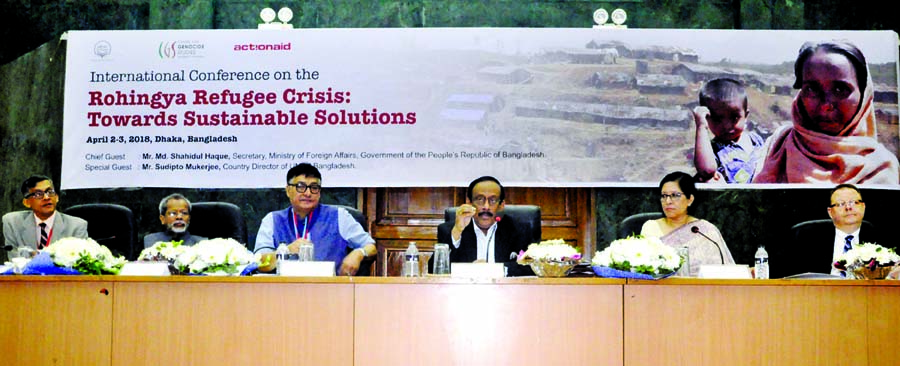
The government planned a series of steps so the upcoming monsoon does not aggravate miseries of Myanmar’s Rohingya community who took refuge in southeastern Cox’s Bazar, Foreign Secretary Md Shahidul Haque said here on Monday.
“We are aware of coming monsoon . . . We have an elaborate plan how we will help these people (Rohingyas),” he told a two-day conference on “Rohingya Crisis: Towards Sustainable Solutions” at Dhaka University’s Senate Bhaban auditorium of Dhaka University.
He, however reiterated Bangladesh’s stance on safe and dignified return of these forcibly displaced people to Myanmar adding “we kept open bilateral, multilateral and civil society windows” to mount pressures on Myanmar for taking them back.
Centre for Genocide Studies (CGS) of Dhaka University, Action Aid Bangladesh and Centre for Peace and Justice of BRAC University jointly hosts the conference being joined by foreign relation experts, students and diplomats.
CGS Director and Professor of international relations at DU Imtiaz Ahmed presented the keynote paper on “Unfolding of the Crisis: Five Challenges” while Canadian High Commissioner to Bangladesh Benoit Prefontaine, United Nations Development Programme (UNDP) Country Director Sudipto Mukherjee, ActionAid Bangladesh Country Director Farah Kabir, Centre for Peace and Justice Executive Director Manzoor Hasan addressed the session.
Terming Bangladesh as a positive and a very transparent country, the foreign secretary said Rohingya people will be relocated to habitable and viable places after ensuring all safety measures.
“We will arrange helicopters to go and visit the places where Rohingya people will be relocated,” he added.
Haque said in terms of freeing policy, Bangladesh has kept open bilateral, multilateral and civil society windows to resolve the Rohingya crisis that has been called one of the worst humanitarian crises.
He said in multilateral window Bangladesh has taken the Rohingya issue to international level including in the United Nations, United Nations High Commissioners for Refugees (UNHCR) and OIC as the international community continues to put pressure on Myanmar to resolve the crisis and ensure safe and dignified return of their Rohingya citizens with equal rights entitled to all nationals of the country.
In his keynote speech, Imtiaz Ahmed suggested the government of Bangladesh to call a conference of the countries sheltering the Rohingyas including India, Pakistan, Saudi Arabia and several other Middle Eastern countries, Thailand, Indonesia, Malaysia and Japan.
“We need to think of two levels of conferences. One conference would be to bring those countries where Rohingyas have taken refuge. And the second level of conference should be an international conference within or outside UN to settle the matter,” he suggested.
Ahmed underlined five challenges to resolve the Rohingya crisis which includes crafting regional consent, ensuring international responsibility, securing civility.
“This is the best time to put into practice the well-known doctrine of Bangladesh foreign policy: ‘Friendship to all and malice towards none’. The policy ought to be engaging with the non-conformists than the conformists,” he said, adding some beginnings have been made through the Prime Minister’s visit to ASEAN (Association of South East Asian Nations) countries, including Cambodia and Singapore.
The international relations expert suggested taking the issue to the United Nations General Assembly for establishing the ‘special documentation centre’ so that international legal instruments on genocide or ethnic cleansing or crime against humanity could be activated and the perpetrators brought before an international tribunal.
Ahmed underscored the need for activating Muslim majority countries within ASEAN and the Middle East countries in resolving the Rohingya crisis.

